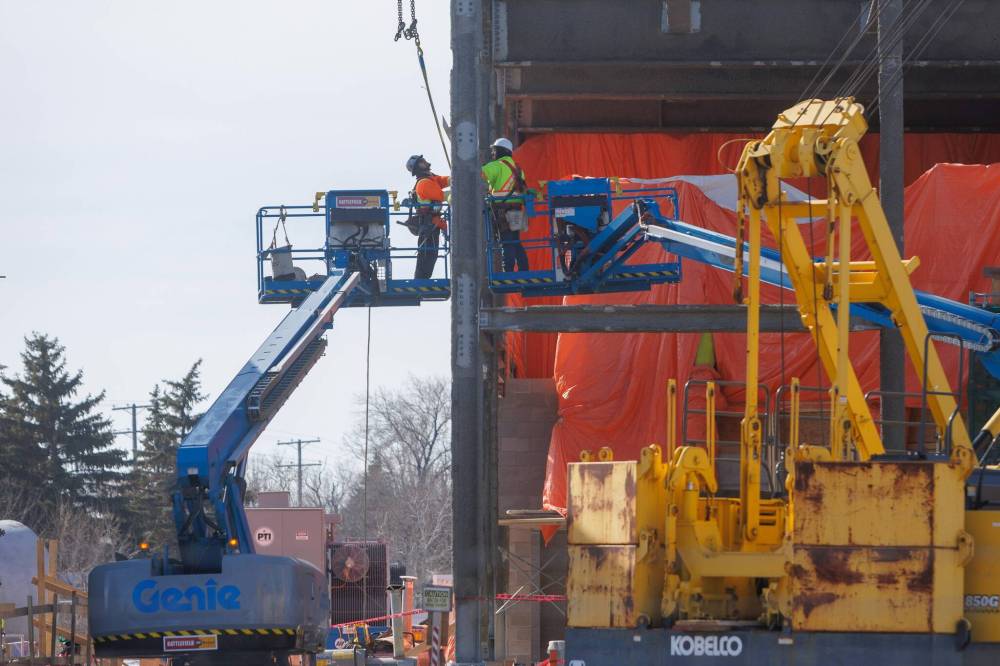Economic growth would go down tubes if sewage-plant project left unfinished: city report
Construction of homes, businesses not possible by 2032 if $3-B upgrade stalls
Advertisement
Read this article for free:
or
Already have an account? Log in here »
To continue reading, please subscribe:
Monthly Digital Subscription
$1 per week for 24 weeks*
- Enjoy unlimited reading on winnipegfreepress.com
- Read the E-Edition, our digital replica newspaper
- Access News Break, our award-winning app
- Play interactive puzzles
*Billed as $4.00 plus GST every four weeks. After 24 weeks, price increases to the regular rate of $19.95 plus GST every four weeks. Offer available to new and qualified returning subscribers only. Cancel any time.
Monthly Digital Subscription
$4.99/week*
- Enjoy unlimited reading on winnipegfreepress.com
- Read the E-Edition, our digital replica newspaper
- Access News Break, our award-winning app
- Play interactive puzzles
*Billed as $19.95 plus GST every four weeks. Cancel any time.
To continue reading, please subscribe:
Add Free Press access to your Brandon Sun subscription for only an additional
$1 for the first 4 weeks*
*Your next subscription payment will increase by $1.00 and you will be charged $16.99 plus GST for four weeks. After four weeks, your payment will increase to $23.99 plus GST every four weeks.
Read unlimited articles for free today:
or
Already have an account? Log in here »
The City of Winnipeg is warning it could run out of sewage capacity for new development by 2032, while urging senior governments to fund the final phase of a mega project that would alleviate the risk.
The city has called on the provincial and federal governments to each cover a third of the cost for the third and final phase of the $3-billion Main Street sewage treatment plant upgrade, which would boost sewage capacity.
The city previously warned it would run out of capacity to process sewage sludge within four to six years, if the project’s second phase to create new biosolids facilities isn’t completed first.

MIKE DEAL / FREE PRESS FILES
Construction workers at the north end sewage plant in March. The city says completing Phase 3 of the project would result in Winnipeg’s economy growing faster.
On Thursday, a new city report predicted the construction of new homes and businesses will not be possible by the year 2032, if the sewage upgrade isn’t completed first.
“If we run out of capacity, it will devastate Winnipeg’s economy in the future and it will also hurt the economies of the municipalities around Winnipeg,” said Mayor Scott Gillingham.
The mayor said the entire project needs to be completed to ensure the upgrade can meet the sewage capacity of a growing population and allow the economy to grow as well.
“All of that plant fits together, so you can’t just stop at the end of Phase 2 and say we have our growth problem solved … You need Phase 3 to support Phase 2,” he said.
The final, third phase of the upgrade would also significantly reduce the amount of algae-promoting nitrogen and phosphorus the sewage plant discharges, pollution that eventually winds up in Lake Winnipeg.
The city report predicts the federal government would get a 53-to-1 return on its investment to complete the last phase of the upgrade, while the province would benefit from a 39-to-1 return.
“All of that plant fits together, so you can’t just stop at the end of Phase 2 and say we have our growth problem solved … You need Phase 3 to support Phase 2.”
That’s based on the plant’s ability to “unlock $186 billion of economic growth” and generate $47 billion in new federal and provincial tax revenue between 2033 and 2050.
The city says the predicted $186 billion in GDP growth is based on allowing new development to continue at status quo levels versus running out of sewage capacity and having no growth at all.
“(This) shows there is a significant return on investment for the federal and provincial governments,” said Gillingham.
The three levels of government have previously agreed to fund the first and second phases of the project, the mayor said.
“The provincial and federal governments have been good partners on Phases 1 and 2. I expect them to be consistent in their investment when it comes to Phase 3,” he said.
Premier Wab Kinew spoke in support of the project Thursday, while also calling for efforts to control its costs.
“We want to see this thing get done but we don’t want to see endless cost overruns and so that’s the work that we’ll do with the city. How do we break this thing down to manageable stages so that we deliver good value for you, the taxpayer?” said Kinew.
The premier did not commit a specific amount of funding for Phase 3 of the upgrade.
The entire sewage treatment plant upgrade was once expected to cost $795 million to complete, a price that has since climbed to $3.092 billion.
In the report, the city warned the average household’s annual utility bill would skyrocket by more than $1,000 by 2027, if Winnipeg sewer and water ratepayers are left to fund the third phase alone.
Coun. Jeff Browaty, chairman of the city’s finance committee, noted the timeline to get the project done is already tight.
“Right now, with full build out, we’re basically looking into the 2030s before it would be done, even if Ottawa and Broadway came over with (the money) tomorrow,” he said. “It is going to require us to change our debt ceiling policy.”
The city plans to take on $468 million in long-term debt, plus $79 million for financing costs to pay its share for the third phase of the upgrade, while it is seeking a combined $994 million from the provincial and federal governments to fund the rest of that phase.
The city’s preliminary budget update will be tabled Friday.
— with files from Carol Sanders
joyanne.pursaga@freepress.mb.ca
X: @joyanne_pursaga
Economic and Fiscal Impact of NEWPCC Upgrades

Joyanne is city hall reporter for the Winnipeg Free Press. A reporter since 2004, she began covering politics exclusively in 2012, writing on city hall and the Manitoba Legislature for the Winnipeg Sun before joining the Free Press in early 2020. Read more about Joyanne.
Every piece of reporting Joyanne produces is reviewed by an editing team before it is posted online or published in print — part of the Free Press‘s tradition, since 1872, of producing reliable independent journalism. Read more about Free Press’s history and mandate, and learn how our newsroom operates.
Our newsroom depends on a growing audience of readers to power our journalism. If you are not a paid reader, please consider becoming a subscriber.
Our newsroom depends on its audience of readers to power our journalism. Thank you for your support.
History
Updated on Thursday, November 13, 2025 4:53 PM CST: Adds quotes, details











